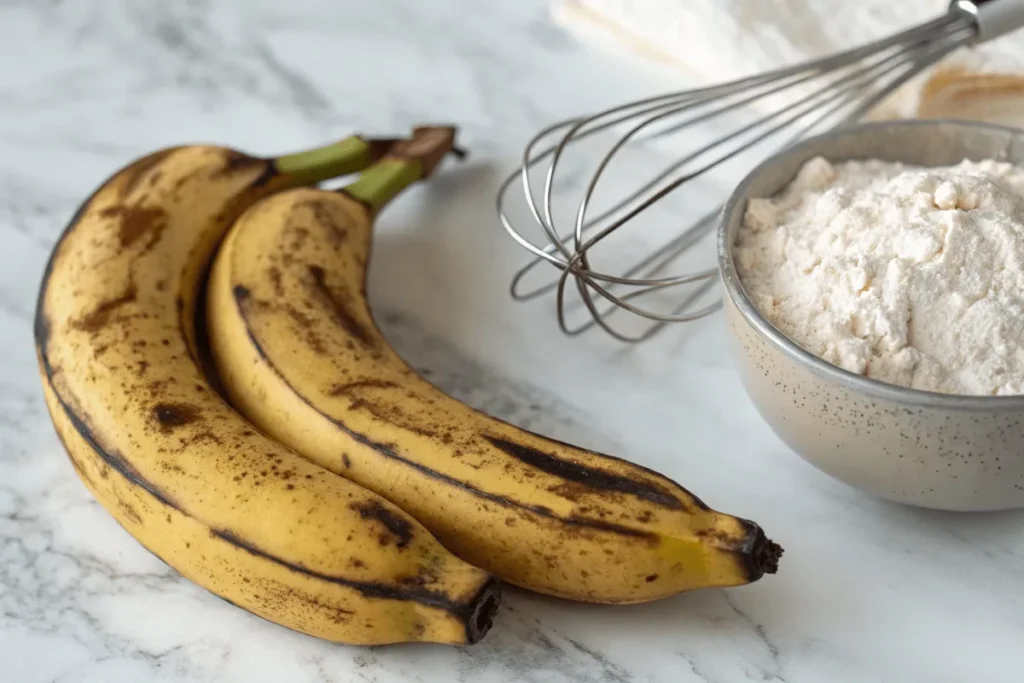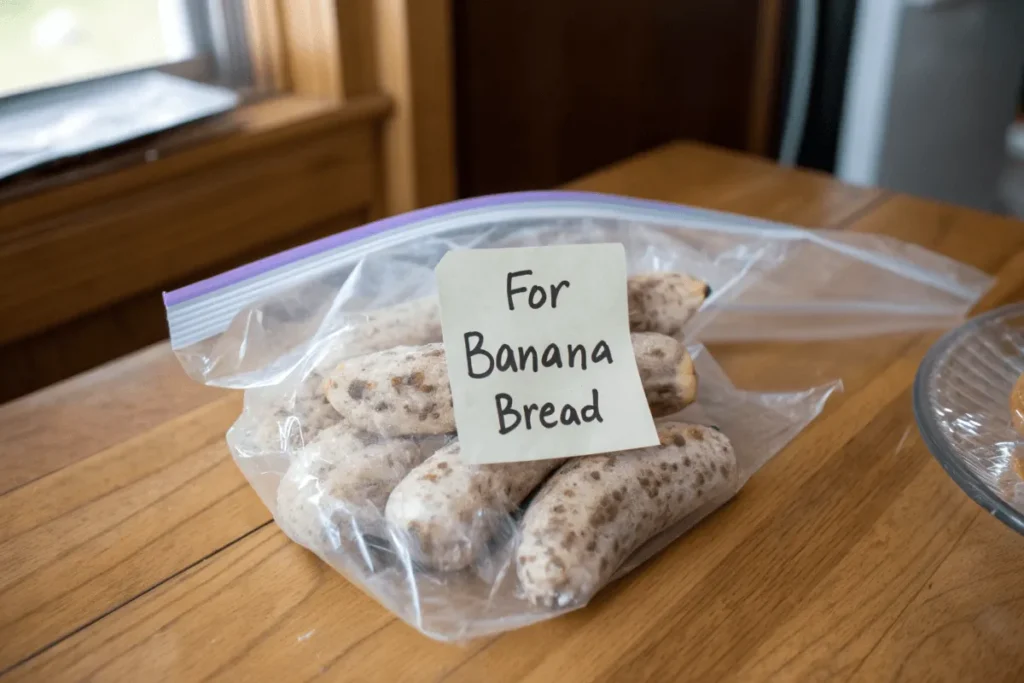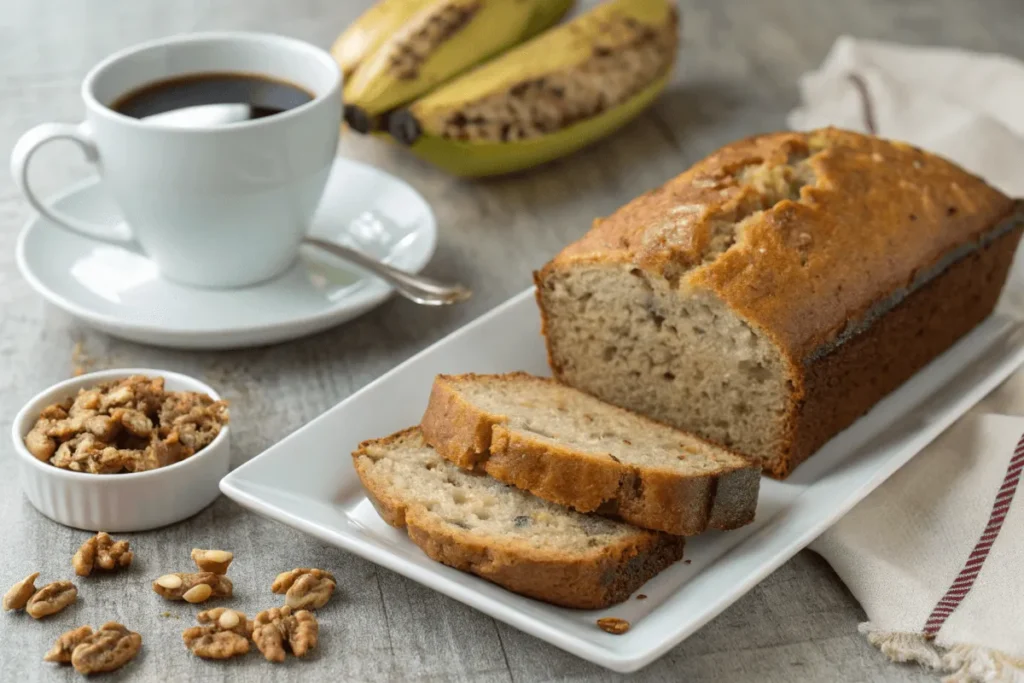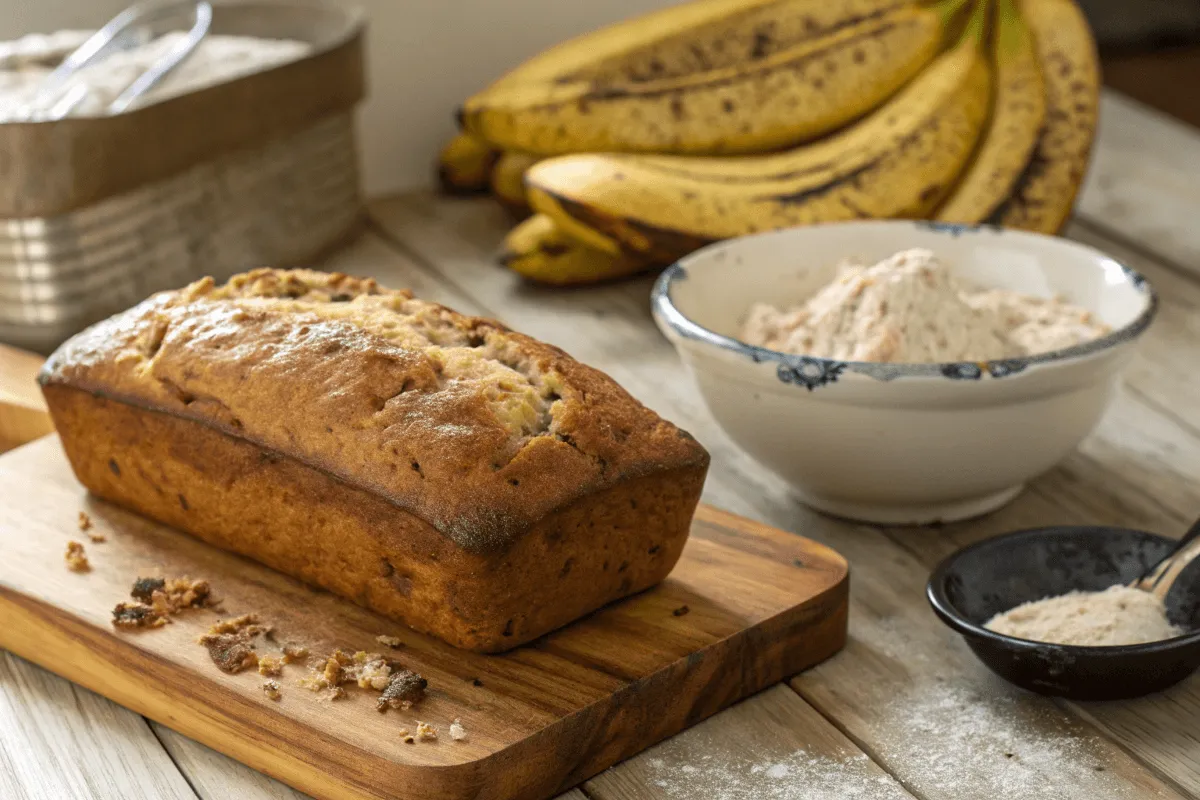Introduction
Banana bread is a beloved comfort food that has been passed down through generations. But have you ever wondered why older bananas are often recommended for making banana bread? The simple answer is that the ripeness of bananas plays a crucial role in the final flavor, texture, and moisture of the bread. In this article, we’ll explore the science behind ripe bananas, why older bananas are better for banana bread, and how they improve the overall baking process. From the natural sweetness to the improved moisture content, you’ll soon see why using overripe bananas is the secret to the perfect loaf of banana bread. Let’s dive into the details!
Table of Contents
Part 1: The Science Behind Banana Ripeness and Banana Bread
When it comes to making banana bread, understanding the science behind banana ripeness can make all the difference. While some people might rush to use fresh bananas for their baking, older bananas hold key advantages that can elevate your recipe.
What Makes Bananas Ripen?
Bananas ripen through a natural process that involves the breakdown of starches into sugars. Initially, bananas are starchy and firm, but as they ripen, the starches begin to convert into simple sugars like glucose and fructose. This process not only sweetens the fruit but also softens it, making overripe bananas much easier to mash. In fact, the browner the banana, the sweeter and softer it becomes, which is why older bananas are ideal for baking banana bread.
The Role of Sugars in Ripeness
As bananas ripen, the balance of sugars shifts. Unripe bananas have a high starch content, which can result in a less flavorful bread. On the other hand, older bananas with more sugars add depth and richness to the banana bread’s flavor. The breakdown of starches into sugars also creates a caramelized taste, which gives your bread a beautifully rich sweetness. This is why banana bread made with overripe bananas is far more flavorful and satisfying than bread made with fresh bananas.
How Ripeness Affects Flavor and Texture
The texture of banana bread is another area where older bananas shine. As bananas ripen, they become softer and easier to mash. This means that when you use overripe bananas, you’re able to integrate them into the batter much more smoothly. This smoothness leads to a finer crumb and a more even distribution of flavor throughout the bread. Additionally, the increased moisture content in ripe bananas helps create a soft, moist loaf, which is the hallmark of a well-baked banana bread.
So, the next time you’re about to bake banana bread, don’t reach for fresh bananas! Opt for those older bananas sitting on your counter. The combination of naturally occurring sugars, increased moisture, and a smooth texture will give your banana bread an unbeatable flavor and consistency.
Part 2: Why Overripe Bananas Are Ideal for Banana Bread
When you think about baking banana bread, the first question might be: Why are older bananas better for banana bread? Well, the answer lies in how overripe bananas transform in ways that give your banana bread the best flavor and texture. Let’s dive into why using those brown, spotted bananas is the secret to a perfect loaf.
The Sweetness Factor
As bananas ripen, the starches inside them gradually turn into sugars, making the fruit sweeter. This natural sugar development in overripe bananas is one of the key reasons they’re ideal for baking banana bread. The more ripe the banana, the sweeter it becomes, and this sweetness gives the bread a rich, caramel-like flavor. If you use fresh bananas, which still contain more starch and less sugar, the resulting bread may lack that deep, natural sweetness.
Moreover, bananas that are fully ripe or even slightly overripe bring out a more intense banana flavor. This not only makes your bread taste better but also provides a more satisfying, indulgent experience. For those who prefer less sugar in their baking recipes, older bananas are the perfect natural sweetener.
Improved Moisture Content
Another great benefit of using older bananas in banana bread is their enhanced moisture content. As bananas ripen, they lose some of their firmness and begin to break down. This results in more liquid in the fruit, which directly contributes to a moist and tender loaf. The extra moisture from overripe bananas helps keep the bread from becoming dry, which can sometimes happen if you’re using fresh, firmer bananas. Moist banana bread is a crowd favorite, and using older bananas guarantees that you won’t miss out on this essential quality.
In fact, the moisture content from ripe bananas is so effective that it often reduces the need for additional liquid in your banana bread recipe. The ripe bananas themselves provide enough liquid to bind the dry ingredients together, making for a better texture and crumb.
For more dessert ideas using overripe fruits, check out this recipe guide.

Part 3: Nutritional Benefits of Older Bananas in Baking
While you may think of banana bread as a decadent treat, using older bananas offers some surprising health benefits, making this beloved dessert a little bit better for you. Let’s take a closer look at why overripe bananas aren’t just tastier—they also pack some nutritional punch.
Higher Antioxidant Levels
As bananas ripen, they accumulate more antioxidants. These antioxidants, like dopamine and other polyphenols, are essential for combating free radicals in the body, promoting better health, and even supporting heart health. Ripe bananas are an excellent source of these beneficial compounds, which help fight oxidative stress. By using older bananas in your banana bread, you’re not just enhancing the flavor and texture, but you’re also boosting the nutritional value of your baked goods.
The antioxidants in overripe bananas are especially significant for anyone looking to increase their intake of healthy compounds while enjoying a sweet treat. It’s a win-win situation: you get a delicious loaf of banana bread with added health benefits.
Increased Digestibility
Another important factor is that older bananas are easier on your digestive system. The increased sugar content in ripe bananas (from the breakdown of starches) makes them more digestible than their unripe counterparts. This makes them ideal for those with sensitive stomachs or digestive issues. In addition, ripe bananas contain more soluble fiber, which is great for promoting gut health.
The fiber content in bananas supports digestive health and helps regulate bowel movements, ensuring that your banana bread provides some healthful benefits along with that irresistible flavor. So, when you’re
If you’re looking for inventive ways to use overripe fruits, don’t miss this unique dessert recipe.
Part 4: The Number One Mistake People Make When Baking Banana Bread
When it comes to baking banana bread, one of the most common mistakes people make is using bananas that aren’t ripe enough. While it may seem convenient to use fresh bananas, especially if you’re in a hurry, older bananas are a much better choice for a flavorful and moist loaf. Here’s why choosing the right bananas is crucial, and how this mistake can affect your final product.
Under-Ripened Bananas Lead to Dry Bread
The number one mistake people make when baking banana bread is using bananas that are still under-ripe or just a little yellow. These bananas contain a lot of starch and lack the moisture that overripe bananas provide. As a result, banana bread made with fresh or slightly ripe bananas can turn out dry and dense.
Why are older bananas better for banana bread? Because ripe bananas have higher moisture content, they help create a soft, tender crumb. The natural sugars in ripe bananas also aid in browning the bread and giving it a deeper flavor. If you use under-ripe bananas, you’ll miss out on these benefits and might end up with a less-than-perfect loaf.
How Using Fresh Bananas Can Alter the Recipe
Using fresh bananas also alters the flavor of your banana bread. Fresh bananas don’t have the same sweet, caramelized flavor that overripe bananas offer. Instead, you might get a more subtle taste that doesn’t quite pack the punch you expect from a good banana bread.
Furthermore, bananas that are not fully ripe are firmer and harder to mash, making it difficult to fully incorporate them into your batter. This can lead to an uneven texture, with some parts of your banana bread being lumpy while others are smooth. To avoid this issue, it’s best to wait for bananas to fully ripen, or even overripe, before you start baking.

For additional tips on preparing ingredients for baking, check out this helpful guide.
Part 5: Practical Tips for Storing and Using Older Bananas
Now that you know why older bananas are a must for banana bread, let’s discuss how you can store them and ensure they’re ready when you need them. Whether you prefer to bake banana bread right away or later down the line, knowing how to handle overripe bananas will make your baking process smoother.
How to Store Bananas for Optimal Ripeness
If you’re buying bananas in bulk, it’s important to store them properly to reach the optimal ripeness. Keep bananas at room temperature until they’re fully ripe. If you want to speed up the ripening process, place them in a paper bag to trap the ethylene gas, which accelerates ripening.
If you’re looking for other helpful tips, check out this guide to perfect baking techniques: Top Fast Recipes.
Part 6: FAQs
In this section, we will address some common questions about using older bananas in banana bread. Understanding these frequently asked questions can help clear up any confusion and provide you with a deeper understanding of why overripe bananas are ideal for baking.
Why use old bananas for banana bread?
If you’re wondering, Why are older bananas better for banana bread?, the answer lies in their increased sugar content and softer texture. As bananas ripen, they break down their starches into sugars, which adds more sweetness to the fruit. This extra sweetness enhances the flavor of your banana bread, making it naturally sweet without the need for added sugar. Additionally, older bananas are much easier to mash, helping you achieve a smoother batter and a more consistent loaf.
What is the number one mistake made when making banana bread?
One of the most common mistakes in making banana bread is using bananas that aren’t ripe enough. Fresh or slightly ripe bananas don’t have the same depth of flavor or moisture that overripe bananas do. As a result, the bread can turn out dry and less flavorful. To avoid this, always make sure your bananas are fully ripe and speckled with brown spots before you begin baking.
Why are older bananas better for you?
Older bananas offer more than just better flavor for banana bread. As bananas ripen, they accumulate more antioxidants, which help fight free radicals and promote better health. These antioxidants can support your immune system and improve your overall well-being. Additionally, overripe bananas are easier to digest, making them a gentle choice for those with sensitive stomachs.
Why do overripe bananas taste better?
Overripe bananas taste better because they are naturally sweeter. The conversion of starches to sugars as the banana ripens leads to a more intense, caramel-like flavor. This enhanced sweetness is perfect for baking banana bread, where a richer flavor profile is desired. In fact, some people even prefer overripe bananas for their intense, sugary taste, which elevates the taste of desserts and baked goods.
For even more baking tips, check out recipes that focus on creating consistently moist baked goods, like this guide to perfect cakes.
Part 7: Conclusion and Final Tips
In conclusion, older bananas are not just a better option for making banana bread—they’re essential for achieving the best flavor, texture, and moisture. The natural sugars and enhanced softness of overripe bananas result in a sweeter, moister, and more flavorful loaf. Whether you’re a seasoned baker or a novice, using older bananas is the key to perfect banana bread every time.
Summary of Key Benefits
To sum it up, using older bananas in your banana bread helps create a naturally sweet, moist, and tender loaf with a richer flavor. The natural sugars and extra moisture from ripe bananas help enhance the bread’s texture and flavor.
Encouraging Experimentation with Banana Bread
Now that you know why older bananas are better for banana bread, don’t be afraid to experiment. Try different levels of ripeness and see how it affects the flavor and texture. The more you bake with overripe bananas, the better you’ll understand how they can elevate your banana bread recipes. Happy baking!


